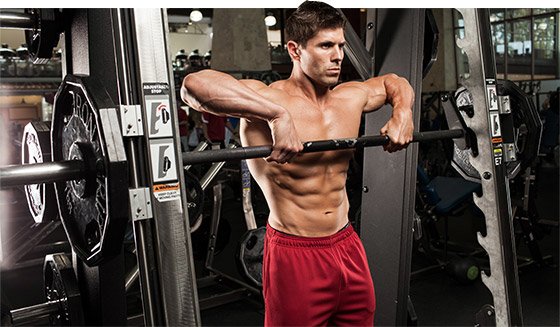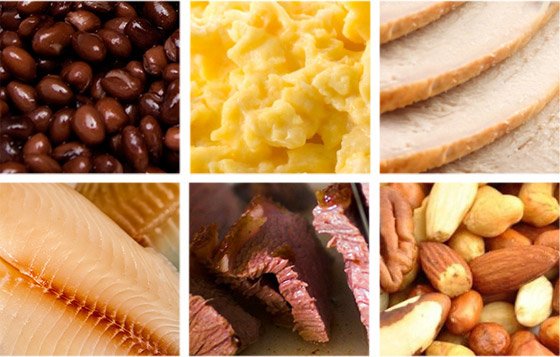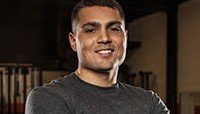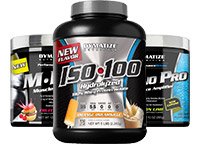Everyone keeps telling me that to get huge I need to eat enormous amounts of food. Is bulking really the answer to gaining mass?
Let's face it, the core goal of bodybuilding is to develop quality mass. We're willing to slave for years just to put on another inch or two on our quads or arms. But it's also true that the obsession with gaining muscle lead athletes to go to extremes, and one of them is clearly the traditional bulk.
Throughout the history of the sport, bodybuilders have separated their diets into two entirely distinct phases: bulk and cut. The first occurs in the offseason and is characterized by consumption of an excess amount of calories in order to gain size—which comes in the forms of both lean mass and fat. During the second phase, which occurs during contest prep, bodybuilders lower their calories and increase their cardio in order to burn off all that fat and get shredded.
This is simply the way things are done. But is it really necessary? Some recent research indicates that there may be a better method. To understand why, let's start by bulking up on the fundamentals of mass-building diet and training.
It All Starts With Training and Protein
The first thing I must emphasize is that without hardcore training, you are not going to get huge. All nutrition talk aside, training is the most powerful stimulus for muscle mass. As I have pointed out in my earlier articles, effective training for mass is built around three primary techniques.1
The first is to obtain a large pump during the training session; this cell swelling response triggers muscle growth. The second is to increase the amount of lactic acid in your muscle, which occurs via short rest period lengths and higher repetitions. The final mechanism for growth is mechanical stress, which is accomplished by lifting heavy weights. These training methods should be cycled throughout the week so you experience each growth stimulus frequently.

Only once your training is in place do you need to start worrying about macronutrients. And when that time comes, the research is clear that protein is a critical priority when it comes to gaining mass.2 However, as I've discussed elsewhere, I would like to change the way bodybuilders approach protein. Most people focus on how much protein they obtain throughout an entire day.
However, research by my brother, Dr. Gabe Wilson, suggests that the real focus should be what you consume to maximize growth at each meal.3 His work suggests that for most people, the optimal amount comes out to about 30-40 grams of high-quality protein per meal. Exceeding this amount hasn't been shown to increase muscle growth.4
The main reason you should select 30-40 grams of protein is that this amount contains the optimal amount of branched-chain amino acid leucine to encourage muscle growth. And just in case all that eating sounds like a tall order for one day, there's another cool thing about Dr. Gabe Wilson's research. He found alternating meals containing whole protein with snacks of supplemental branched-chain amino acids optimizes growth, too!
Calories Enough, but Not Too Much
Training: check. Protein: check. OK, now you can start manipulating calories. But this doesn't mean you need to start eating every calorie-rich food in sight.

Can you gain muscle without taking in excess calories? The answer is actually yes. My lab recently published a study in the "European Journal of Applied Physiology" where we optimized protein intake, but kept calories at maintenance in the subjects.5
We found that these highly trained subjects gained muscle and lost fat at the same time, with minimal change in their total bodyweight. In other words, training hardcore while on maintenance calories can actually shift your body to a more muscular, less fat appearance.
The premise for our study wasn't entirely new; it was the subjects who made it special. Up until recently, nearly all of the studies which overfed subjects were done in sedentary (non-training) subjects. The most-cited study to date took sedentary people and overfed them for 100 days by 1,000 calories per day.
The average body weight increase for the subjects during the overfeed was 17 pounds, of which 67 percent was fat, and only 33 percent was muscle mass.6 This research shows that excess calories can lead to both fat mass and lean mass, and it seems to support the idea of a traditional bulk.
My lab is the first to look at the impact of bulking in guys who were actually training hard. In addition to the above study, Sean McCleary headed up another study where we overfed subjects with either a moderate 800 calories or an extreme 2,000 extra calories per day for 45 days.7 This was markedly shorter than past studies, which lasted 100 days or longer. Subjects in our study also trained every body part to extreme levels several times per week.
We found that both groups increased their muscle mass by approximately 6-8 pounds. But, the difference when it came to fat gain was more pronounced. While the moderate calorie group lost 2 pounds of fat, the extreme calorie group gained 2 pounds of fat! This tells us that while extra calories can be anabolic, there is a ceiling for their positive effects.
Past this ceiling, excess calories will be stored as fat. The result is that it will take you longer to cut down, and when you do that, it will cost more muscle tissue from catabolic breakdown.
Short Duration, High Protein
Want to know how to build quality mass? Here's your roadmap in two sentences:
- Optimize your training.
- Optimize your protein intake.

That alone is enough to ensure you add muscle. However, if you want to accelerate this process, then consuming calories above that needed to maintain weight can be advantageous—to a point. There is a limit to the potential anabolic effects of overfeeding, after which you aren't gaining any more muscle, but only fat.
Our study suggests that any overfeed should probably be no more than 500-800 extra calories per day. Further, keeping your bulks shorter, in the range of 30-45 days, will maximize muscle gains and minimize fat gains.
Now what are you waiting for? Go get those gains!
References
- Schoenfeld BJ. The mechanisms of muscle hypertrophy and their application to resistance training. J Strength Cond Res. 2010 Oct;24(10):2857-72.
- Wilson J, Wilson GJ. Contemporary issues in protein requirements and consumption for resistance trained athletes. J Int Soc Sports Nutr. 2006 Jun 5;3:7-27.
- Wilson GJ, Layman DK, Moulton CJ, Norton LE, Anthony TG, Proud CG, Rupassara SI, Garlick PJ. Leucine or carbohydrate supplementation reduces AMPK and eEF2 phosphorylation and extends postprandial muscle protein synthesis in rats. Am J Physiol Endocrinol Metab. 2011 Dec;301(6):E1236-42.
- Moore DR, Robinson MJ, Fry JL, Tang JE, Glover EI, Wilkinson SB, Prior T, Tarnopolsky MA, Phillips SM. Ingested protein dose response of muscle and albumin protein synthesis after resistance exercise in young men. Am J Clin Nutr. 2009 Jan;89(1):161-8.
- Wilson, J. M., Lowery, R. P., Joy, J. M., Andersen, J. C., Wilson, S. M., Stout, J. R., ... & Rathmacher, J. Wilson JM, Lowery RP, Joy JM, Andersen JC, Wilson SM, Stout JR, Duncan N, Fuller JC, Baier SM, Naimo MA, Rathmacher J. The effects of 12 weeks of beta-hydroxy-beta-methylbutyrate free acid supplementation on muscle mass, strength, and power in resistance-trained individuals: a randomized, double-blind, placebo-controlled study. Eur J Appl Physiol. 2014 Mar 6. [Epub ahead of print]
- Tremblay A, Despres JP, Theriault G, Fournier G, Bouchard C. Overfeeding and energy expenditure in humans. Am J Clin Nutr. 1992 Nov;56(5):857-62.
- McCleary, S.A., Rauch, J.T., Silva, J., Ormes, J., Lowery, R.P., and Wilson, J.M. Effects of energy load on resistance training adaptations. National Strength and Conditioning Conference; 2013 Jul 9-12; Las Vegas, NV.
Recommended For You

Ask The Muscle Prof: How Do I Target Fast-Twitch Muscle Fibers?
Fast-twitch muscle fibers aren't just important for sprinters and competitive weightlifters. Here's what they have to offer bodybuilders!
Mass Class Nutrition: The Fundamentals Of Eating For Muscle Growth
You can drive yourself crazy with the what, when, and how of muscle-building nutrition. Or you can master the fundamentals with guidance from Dr. Jacob Wilson.


